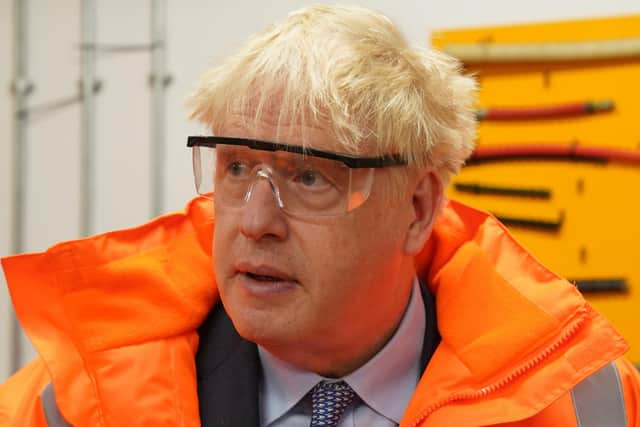Vote of no confidence: What happens if Boris Johnson loses?
Despite ministers repeatedly claiming the matter was closed, 54 members of his own party submitted letters calling for him to be removed.
It would now take just 180 MPs to see the Prime Minister ousted, with the result announced Monday evening at 9pm.


Advertisement
Hide AdAdvertisement
Hide AdIf Mr Johnson wins, he traditionally would be safe for another year, though the rules have now been changed.
But if the Prime Minister loses, what happens next and what problems will his successor have to deal with?
Tory leadership contest
If 180 Tory MPs votes against the Prime Minister, this would see him removed as party leader, triggering a leadership election.
Under the UK constitution there must be a Prime Minister at all times, so despite a humiliating defeat Mr Johnson would likely stay on until a replacement was found.
When Theresa May resigned six months after winning a no-confidence vote, the process took two months.
The 1922 Committee would then decide the procedure and timetable for a leadership contest to replace Mr Johnson.
Candidates would need the support of eight other Tory MPs, with a designated proposer, seconder and six others.
In the likely event there were more than two candidates, as there was last time, there are then a series of ballots.
Advertisement
Hide AdAdvertisement
Hide AdIn the first round, candidates need 5 per cent of the vote, currently 18 MPs.
The second round requires 10 per cent, equivalent to 36 MPs, then every subsequent round sees the candidate with the least votes eliminated.
Down to a final two, Conservative Party members around the country then vote after a series of debates and campaigning.
The winner will then become Tory leader and, unless there is a general election, Britain’s new Prime Minister.
Election
Assuming the new leader was able to command the confidence of the House of Commons, they would not have to call a general election.
However, they could choose to call one to secure their own mandate, which former prime minister Gordon Brown was under constant pressure to do so when he replaced Tony Blair.
Doing so would allow any replacement to dismiss claims they had no mandate by pointing to an election win.
As well as silencing criticism from opposition parties, it would also enable the new leader to shore up support among their own party.
Advertisement
Hide AdAdvertisement
Hide AdThe Conservatives are a broad church, but after trying to force out a third Prime Minister since 2016, they are one constantly at war with themselves.
An election win could unite a party that can include strong Brexiteers, Covid sceptics, Remainers and those more supportive of immigration.
Reshuffle
Having formed a Government, the new Prime Minister would then need to conduct a reshuffle that balances keeping enough dissident in to maintain unity, but also makes a clean break from the past.
Mr Johnson failed to do this after winning the leadership contest, booting out Jeremy Hunt in a move that enraged his supporters.
There were no jobs for anyone who voted against him in the leadership race, with loyalty valued above all.
If the new leader were to bring the party together, they would need to offer roles to the main rivals while also showing this was a new Government not tarred by association with that of Mr Johnson.
Scotland
When running to be Prime Minister, Mr Johnson announced he would be the self-appointed minister for the Union, a role he has not performed brilliantly.
Under his stewardship, the head of the Union Unit was backed by his spokesman, fired the next day, then the whole thing disbanded weeks later.
Advertisement
Hide AdAdvertisement
Hide AdSince then the Prime Minister has set up a new group focusing on the Union, but he continues to poll appallingly north of the border.
There is also a rift to be fixed with the Scottish Conservatives, many of whom demanded the Prime Minister go over Partygate.
Any replacement would have to extend an olive branch to win them back over, with the group’s leader Douglas Ross one of those demanding Mr Johnson go.
Then there is the issue of an independence referendum, something repeatedly ruled out by Mr Johnson’s Government.
With Holyrood drafting legislation, any incoming leader would have to win over Scottish voters or prepare for legal action.
By-elections
The Tories have had a spectacular fall in popularity, with the party on 39 per cent, four points ahead of Labour, just before the Owen Paterson affair last year.
Since the Sue Gray report was published, the party’s average has plummeted to 32 per cent, seven points behind Labour, and not showed any sign of rising since January.
Now the party faces two crucial by-elections, both of which it is tipped to lose.
Advertisement
Hide AdAdvertisement
Hide AdThe Tories will almost certainly lose in the Wakefield by-election, but with the Liberal Democrats gradually edging up in the polls and taking a series of Tory seats, the Tiverton and Honiton seat could see yet more Conservative defeat.
Making clear this is a different Government and bringing momentum in the face of a 10 per cent swing to Labour is crucial for any incoming leader.
Current polling would put nearly one in three Tory MPs at risk from both Labour and the Liberal Democrats.
It’s one thing to replace Mr Johnson for misleading Parliament, but becoming leader means winning, which is why so many MPs are hesitant to remove him.
The Prime Minister is a force of nature who has won every election he has contested.
This scandal has rocked him, and any replacement will have to show they can keep his coalition of voters together if they are to survive.
Comments
Want to join the conversation? Please or to comment on this article.

